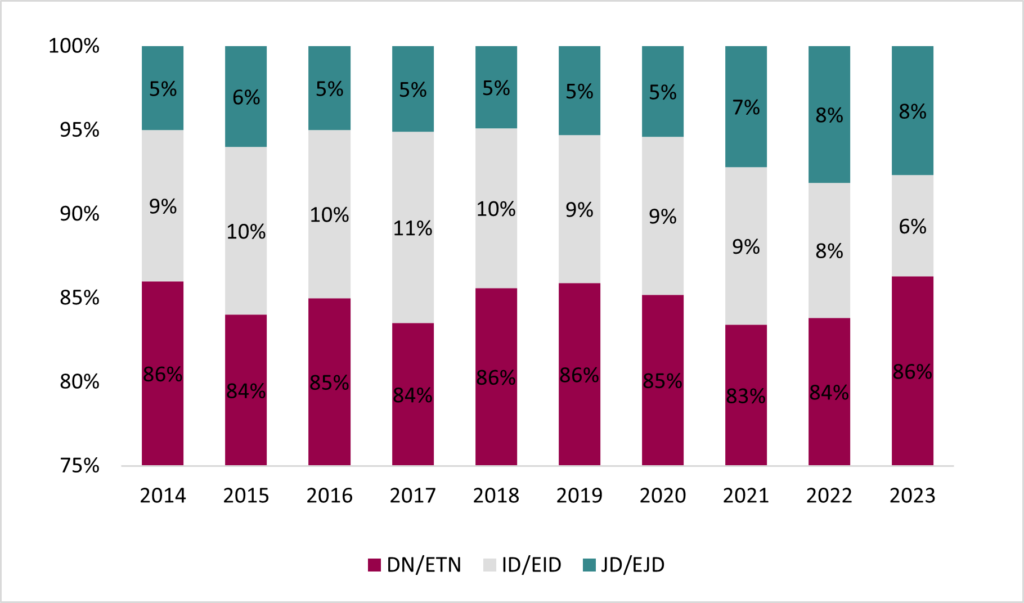More competition in the MSCA Doctoral Networks 2023: a look at the statistics
1st December 2023 at 1:55 pm
The third submission deadline for the MSCA Doctoral Networks (DNs) within Horizon Europe was 28 November 2023. This year’s call was marked by important changes in the rules and length of DNs. First, in standard DNs, the maximum number of researcher months increased back to 540 (vs 360 in 2021 and 2022), enabling consortia to recruit up to 15 EU-funded Doctoral Candidates again. Second, in Joint Doctorates, Doctoral Candidates can be recruited for up to 48 researcher months instead of 36 months, increasing the total project duration to up to 60 months. What are the effects of these rules on the number of applications? The first call statistics gives us interesting insights.
A total of 1,066 proposals were submitted, including 920 standard DNs, 64 Industrial Doctorates (DN-IDs) and 82 Joint Doctorates (DN-JDs). Since the EU is expected to fund over 150 projects through this call, we expect the success rate to be around 15%. When comparing the share of the types of DNs with the ones of the first Horizon Europe MSCA-DN calls in 2021 and 2022, we observe that the percentage of standard DNs increased up to 86%. As noted in a previous blog post on the 2022 statistics, the decrease of researcher months from 540 to 360 with the start of Horizon Europe may have made standard DNs less attractive, as they could recruit a maximum of 10 Doctoral Candidates. This year’s increase suggests that applicants are unsurprisingly keener in applying to the standard DNs if more resources are available. The share of JDs remained stable at 8% despite the increased duration of this type of DNs, while the share and the number of ID applications are at their lowest. This could be explained by the expectation that the Doctoral Candidates must spend at least 50% of their time in the industry sector, which necessitates significant efforts to build consortia able to make this possible and may raise concerns about the actual implementation if the proposal gets accepted.

Results expected in April 2024
As stated on the MSCA webpage, the evaluation results will be communicated in April 2024, and the first successful DNs are expected to start in September 2024.
The next deadline is on 27 November 2024. Applications that received a score below 80 this year will not be eligible for resubmission.
Our track record and services from FP7 to Horizon Europe
We have long-standing experience from more than 20 ITNs funded under FP7 and Horizon 2020 and six in the Horizon Europe DN calls with BREAKthrough, CONcISE, DarChemDN, MITGEST, MobiliTraIN, SYNSENSO and the ID MIRELAI. Typically, our first role is to support proposal writing and execute the grant preparations with the European Commission. During the project implementation, we then work as an Associated Partner in the consortium, assisting in project management tasks, coordinating the communication and dissemination activities and contributing to the training of the Doctoral Candidates with our Transferable Skills Training Programme, which has become an integral part of many innovative Doctoral Networks. If you want to be notified as soon as we publish any MSCA-DN-related news, you can subscribe to our blog posts and stay updated about the latest developments, trends, and results.

Marco Cavallaro
Research & Innovation Project Manager

Jacqueline Strehler
Research & Innovation Project Manager
